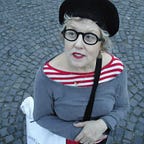Identity — Oh How We Grasp for It
Anthropologists say that identity is everything. What they mean by that pithy phrase is that every person on earth has deep attachments to various levels of society that reinforce who we are. Belonging is essential to our species, presumably because it helps us prosper as inter-dependent group-living animals, and when our identity is shaken, broken, or wiped out, we become distraught. Some of these identities are inherited at birth while others are acquired over a lifetime. And much of our lives are spent ruminating about our place in society and the world; we are most comfortable, at peace really, when our role is clearly defined and consistently upheld.
I teach a university class called “The Anthropology of Everyday Life,” and on the first day, I introduce the concept of identity by asking the students to share the way they conceive of themselves. I always start with myself and point out that the list is not in any special order. I tell them, everyone’s list changes all the time, throughout the day and certainly over a lifetime. I then define myself as a mother, anthropologist, writer, white person, scholar, scientist, knitter, funny person, and smart person. The identity “knitter” is probably the most confusing to them, but not to other knitters, which is, of course, the point — a group not open to all, a group that insiders understand and outsiders think is weird.
Note that on my list there is no mention of citizenship (American), ethnicity (Polish and Scottish), nor of religion (former Catholic) because those labels mean absolutely nothing to me. They are no part of my identity although they are part of me. Also, nothing on that list involves a place for me in a family besides being a mother, the most profound part of my identity as I conceive of it. That’s because I don’t have much family and I never see the ones that I do — they are not significant to my sense of self. My other chosen identities, the group ones, are sketchy at best — anthropologists, scholars, scientists — these are, in fact, activities best done alone.
When the students begin to speak up, their identity lists are as complex and varied as they could be. Ethnicities and religions fill the classroom, hobbies are revealed, attachments to family and friends take first place, and what I hear is the recognition in each of them that these levels of belonging suffuse every aspect of their lives. Their answers speak to the plethora of identities we give ourselves, especially the ones we cherry-pick by choice as we go through life
I start the class with this exercise because we in western cultures always seem to be flailing around for some sort of identity, untethered to ourselves, as it were. We often opt to grasp publicly for an identity by donning clothing with the logo of some sports team, or with a sweatshirt bearing the name of a college we attended decades ago. There are even announcements of personal life-defining identification with various foods eaten, the I-am-vegetarian-vegan-gluten intolerant-can’t eat dairy-no sugar-no carbs-avoiding fats-only organic sort of pronouncement that suggests food decisions make a person who they are. Also, there is a lot of conversational air these days as people clarify their identity with announcements of their likes and dislikes, as in “I hate crime fiction” or “l like sweaters with buttons.” Everyone seems to be hoping for some kind of nod from others so that can they form a group with their same likes and dislikes.
These types of grasping for identity are superficial, made to fill the void we suffer because American culture prides itself on self-reliance, independence, and individuality. The result of that belief system is loneliness and not having a strong identity. So, we often make up our identities as we go along, sometimes taking the bits and pieces of our likes, choices, and inclinations as we grasp for a place to fit in.
